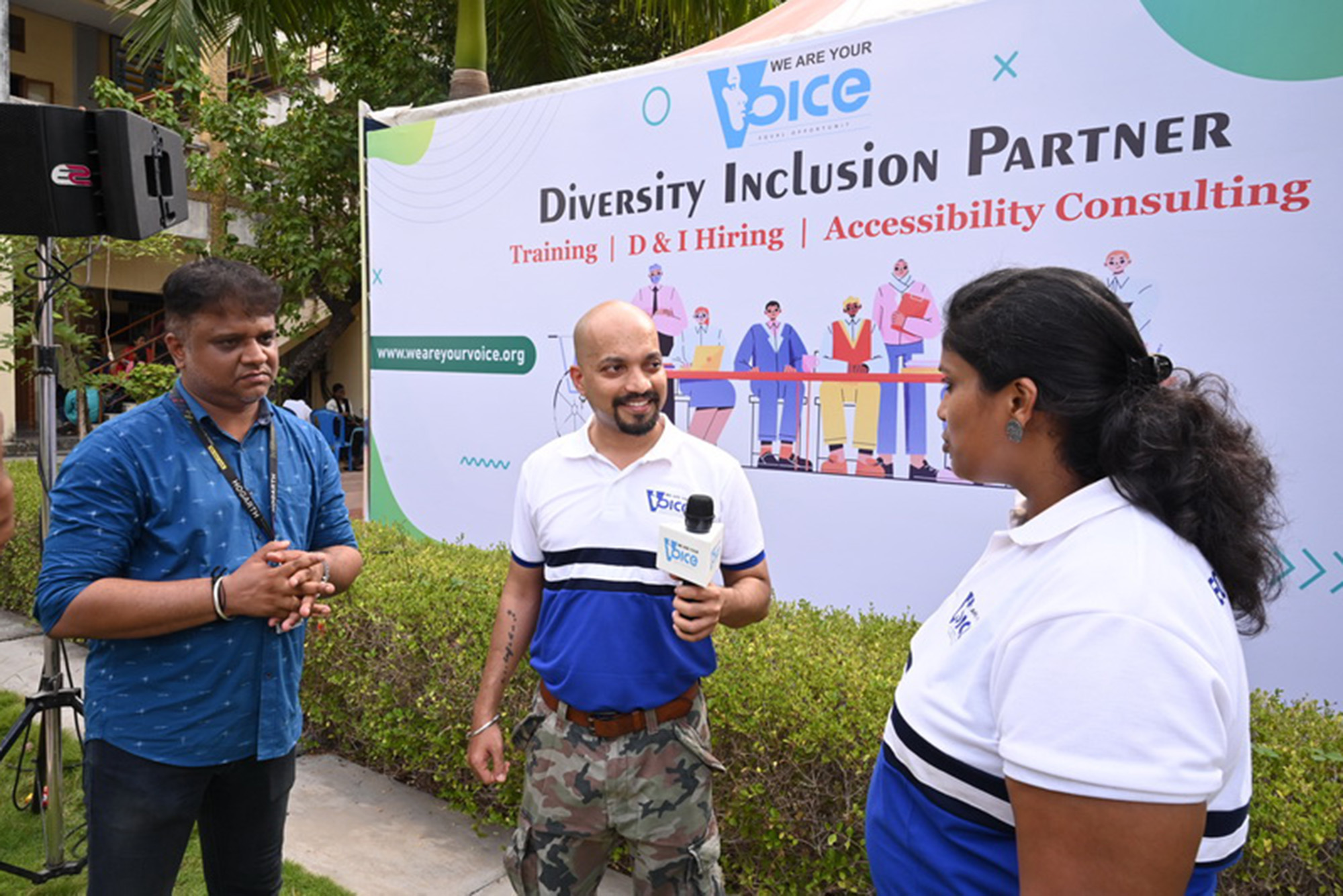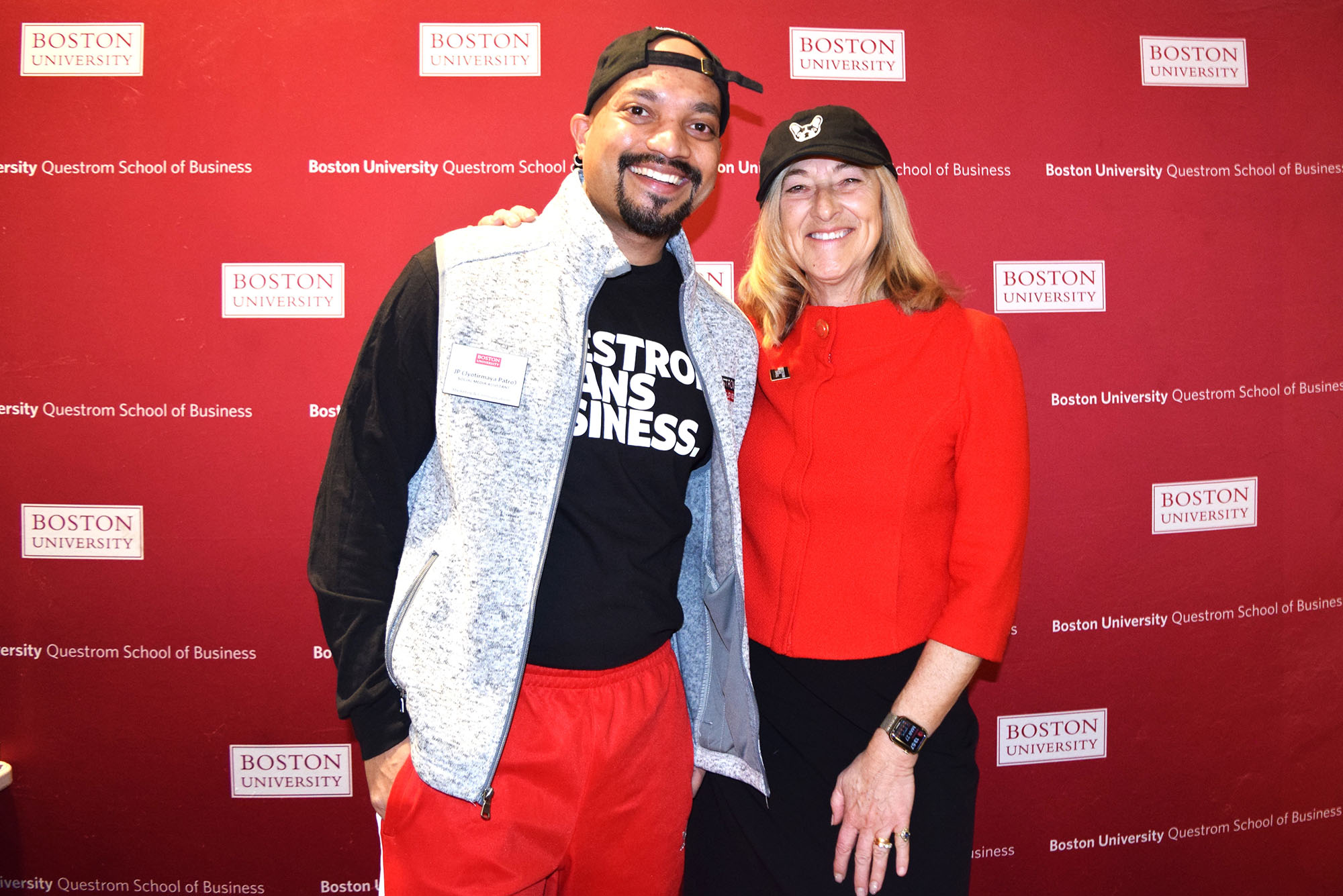Determined to Make the World a Better Place was originally published on BU Today
Questrom MBA student Jyotirmaya Patro hopes to use his education to deliver health care to those who need it most
April 3, 2024
For some people, gratitude can be a powerful motivator for transforming the world around them.
Jyotirmaya Patro is one such individual.
Patro (Questrom’25) wears many hats: he’s an entrepreneur, a global diversity, equity, and inclusion advocate, a minor LinkedIn influencer, a public speaker, a yogi, a photographer, and a husband and father. As of late, he’s also a Questrom School of Business graduate student—working on dual master’s, in healthcare business administration and in digital technology—who came to Boston University at the age of 40 after taking a leave of absence from a successful career in start-ups and technology in his native India.
His is a story of humble beginnings, fierce determination, and a deep commitment to leaving the world better than he found it.
His secret? Never forgetting his roots.
From “the whole village was my family” to bullying and humiliation
Patro’s journey began in Gurandi, a small rural village in the state of Odisha, India. His family was impoverished—he owned only a few items of clothing and he often had to forage for food from plants growing on the surrounding mountains—but the community around him was tight.
Growing up, “the whole village was my family,” Patro recalls.
An excellent student, he left Gurandi to pursue higher education in a nearby city, studying information technology at a vocational college. But he struggled to adjust to city life. His classmates bullied him for being poor and unsophisticated. Back home, everyone was considered family and was treated as such. The privileged students he met in college, however, were jaded and judgmental, quick to mock his earnestness.
“Until that time, I had never had an education that differentiated between professional and unprofessional behavior,” Patro says. “What worked at a rural school didn’t work at a big college. I experienced humiliation all the time and started suppressing myself.”
He gradually adapted to the city, but things remained difficult after graduation. He spent two fruitless years trying to find employment. At his lowest point, he considered ending his life rather than admit failure to his family.
But his parents never stopped believing in him. “God has something better for you,” his mother assured him.
Finding his calling
Throughout his struggles, Patro says, “there was a fire in me all the time.” He returned to school, attending the Biju Patnaik University of Technology in Odisha, where he earned a bachelor’s degree in information technology. He graduated in 2009—in the midst of the global financial crisis—and took jobs as a custodian and a call center worker while he worked to break into the tech space.
His luck turned around in 2011, when he started a job as a business intelligence engineer for a B2B (business-to-business) digital services and consulting company. His first client? Apple. He was laid off two years later, but quickly found a new job as a lead data analyst for Capgemini, another digital B2B firm, this time working on the Morgan Stanley team.
That’s when he found his calling.
As he began climbing the corporate ladder in India, Patro found that he had a deep desire to give back to the communities around him. And specifically, to marginalized communities. “Since I come from an underprivileged background,” he says, “I wanted to focus on the communities who nobody was focusing on.”
He began actively volunteering, leading education workshops for the girl children of sex workers through the ENLIGHT project, a Capgemini partner program that helps disadvantaged girls rise above their circumstances. Then he became involved with We Are Your Voice, a nongovernmental organization that connects employers with job candidates with disabilities, where he helped organize job fairs, collaborated with government offices to establish a job training and placement forum, and created a digital help desk to assist people with disabilities during the COVID-19 pandemic, among other projects.

“I’ve contributed a big part of my life to people with disabilities,” Patro says. “In the last several years of my journey I’m proud to say that I have helped more than 10,000 disabled people find jobs.” Not to mention his help desk, which provided more than 50,000 disabled people with daily essentials like food and medication during the pandemic.
He has also volunteered in support of initiatives to empower India’s LGBTQ+ community and women in technology. And he used his tech background to help others, supervising and mentoring at dozens of hackathons aimed at finding technological solutions for the world’s pressing issues, working with the likes of Harvard, MIT, and even the United Nations.
As for the corporate world, Patro continued to move up in the tech space even as he devoted more time to volunteering. He entered the start-up sphere in 2019: his second venture, AI-powered safety sensors designed to help elderly parents age in place, generated significant buzz before petering out during lockdown, he says. Around the same time, he left Capgemini to join German biopharma giant Merck as a product portfolio manager.
Questrom and beyond
Then he walked away from it all.
“Throughout my life, I’ve never been materialistic or money-minded,” Patro says. “I always work so hard for all of my experiences and to give back to the society that has helped me become who I am today.”

Working for Merck cemented his interest in healthcare and health tech. He decided that if he wanted to become a global leader in the field, thereby helping even more people, he’d need to go back to school.
Questrom’s MBA in health sector management is one of the top-rated healthcare MBA programs in the country. In 2023, Patro left his home and family in India to pursue dual master’s, in healthcare administration and in technology. His goal: to learn everything necessary to become an empathetic healthcare leader and bridge the gap between underserved communities and essential healthcare services.
Throughout his corporate experiences, he says, “I’ve learned that empathy is the most important skill in a businessperson. You don’t only need the technological expertise or the business expertise.” At BU, “this is not a journey of my education, but my journey of a lifelong dream.” With two BU MBAs under his belt, his goal is to “improve access to healthcare for vulnerable populations, ensuring that everyone has the opportunity to lead healthy and fulfilling lives.”
[Being at BU] is not a journey of my education, but my journey of a lifelong dream.Jyotirmaya Patro
Outside of his coursework, Patro—JP to his colleagues and classmates—works as a social media assistant in Questrom’s marketing and communications department, a diversity educator in the school’s Center for DEI, and an MBA ambassador for the graduate admissions team. He also photographs the odd event or two when asked.
“Having JP on the Questrom MarCom team is a gift,” says his supervisor, Katie Gauthier, a Questrom digital communications specialist. “His perspective on diversity, equity, and inclusion and his background have helped us raise the bar on our content to be more representative of the diverse Questrom community. His curiosity, adaptability, and the fact that he takes his camera almost everywhere has strengthened our connection with a wide range of folks from different programs across BU.”
How does he do it all? It’s a fair question, and the one Patro says he gets asked the most.
First, he runs to stay fit. He also relies heavily on yoga and meditation—the “best medicine,” he says—to de-stress and keep himself grounded. His biggest motivator, however, is the “fire” that’s kept him going since his youth.
Coming from his village, “nobody could even think of going to a different country to pursue an education—even a regular education,” he says. “People cannot even dream about that.” To have had the opportunities he’s had is a blessing he says he’ll spend the rest of his life trying to pay back.
His parents, the longtime champions of his dreams, passed away some years ago. “My parents worked so hard and suffered much before dying early in life,” Patro says. Knowing how proud they would be of him today “gives me a chance to cherish my journey. That motivates me in my life’s work: that the problems which I have faced in my life, no one else will face.”

